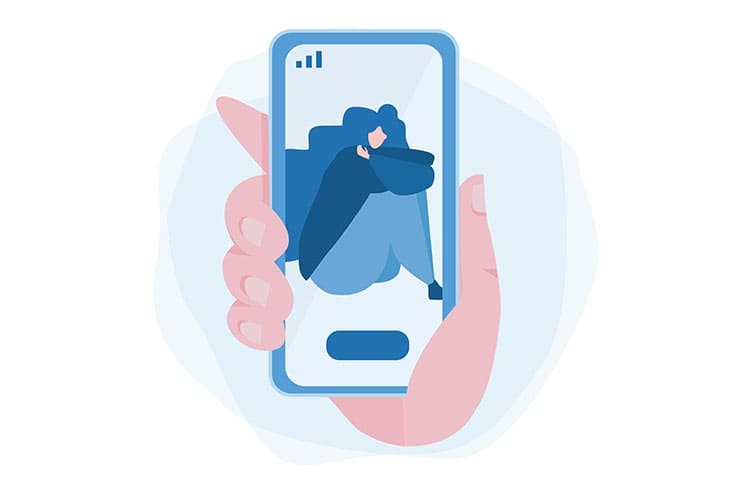July 02, 2021
By William Horn

I started volunteering for a suicide prevention hotline in June 2020. It had become clear that COVID-19 wasn’t going anywhere anytime soon, and I decided I needed a helpful distraction — or my mental health might deteriorate more, faster. Maybe it sounds counterintuitive, but I’ve always found it easier to care for others than myself. After three months in quarantine, I desperately wanted to feel helpful — or maybe just not helpless anymore.
I chose a hotline manned by trans people for trans callers. As a transgender person, I know our community can sometimes feel like quicksand because so many of us must live invisibly to stay safe. I could imagine just how overwhelmed trans folks were probably feeling during a time of isolation.
Through my experience of listening to callers, I realized that depression and suicidal thoughts might actually be “normal” reactions to the intensely difficult circumstances many trans people find themselves in. It took me some time to process that my role was not only helping callers envision better times to come, but also validating that their feelings are understandable considering all of the hardships associated with a trans identity.
Learning How to Be Helpful
In some ways, I’m at the very top of the privilege “pyramid”: white, cis-passing, straight-passing, well educated, personally wealthy. I knew that taking calls would be a reality check about how other trans people really live, and I figured I was probably long overdue for a dose of this perspective.
After months of training, I finally started taking calls around Thanksgiving — a tricky time to start a care position of any kind. Sometimes a caller would scream and scream, and I’d fight the urge to hang up, to run from bearing witness to their grief and anger. Some callers would talk aimlessly, then slowly reveal a trauma I didn’t feel qualified to approach without several degrees. The most painful calls were always from kids, trapped in households that didn’t accept them. These calls seemed to underscore just how little direct help I could be.
This made me angry at first. I felt stupid telling someone who had faced months of abuse by family members to go take a bath or drink some water, recommending therapists they had limited access to. I felt like a doctor in a warzone where soldiers arrived with missing limbs — and all I had to offer was lollipops and Band-Aids.
With time, though, I came to understand the value in listening — even if, in the moment, my presence on the other end of the phone felt inadequate when stacked up against what I would hear. Holding space for someone in crisis can be incredibly powerful, even just to give them a minute to regain calm and catch their breath.
Reevaluating My Understanding of Mental Illness
When I began volunteering, I understood depression simply as an illness to be cured and a problem to be corrected — a pathology. And, in some ways, it is: Depression is a mental health condition that requires monitoring, therapy and, often, medication. It is also a condition that can be managed, and people living with depression can and do lead fulfilling lives.
But reducing the pain and desperation trans folks are feeling to the symptoms of an illness overlooks the overwhelming loneliness, poverty and rejection to which they are responding. This is why my first response to a caller needs to be one of validation. If I can’t empathize with depths of the pain they express, I can’t build trust.
I keep this in mind every time I answer a call, especially now, as 2021 is set to be record-breaking for the trans community in all the worst ways. There are more than 100 anti-trans bills currently in motion. Most of the anti-trans legislation is focused on keeping trans athletes out of women’s sports, but some bills are designed to stop trans youth from gaining access to hormone replacement therapy or gender affirming surgeries that are, frankly, lifesaving.
I hear about this legislation on almost every single call I take: teens who just want to play school sports with their friends, young adults worried about losing access to the meager health services they have or elders worried that the community will see a rise in both violence and suicide.
Acknowledging the Challenges of Being Trans
As a community, we get called “brave” a lot — and we are. All trans people have to be brave because we face the constant threat of violence, job discrimination, hostility in social environments and barriers to necessary care.
One day, trans folks won’t need to be brave to live. But until that day arrives, I think we need to broaden our understanding of the intersection of depression and gender identity. Extreme sadness is not always a symptom of mental illness, but often a fair response to overwhelming odds. If we keep that in mind, we can better address callers or patients concerns and, ultimately, direct them to effective resources and care.
William Horn is a writer working on a trans rom com and a memoir. He received his MFA in nonfiction writing from Columbia University and currently resides in Brooklyn. More of his work can be found here: https://williamh.me/
Submit To The NAMI Blog
We’re always accepting submissions to the NAMI Blog! We feature the latest research, stories of recovery, ways to end stigma and strategies for living well with mental illness. Most importantly: We feature your voices.
LEARN MORE